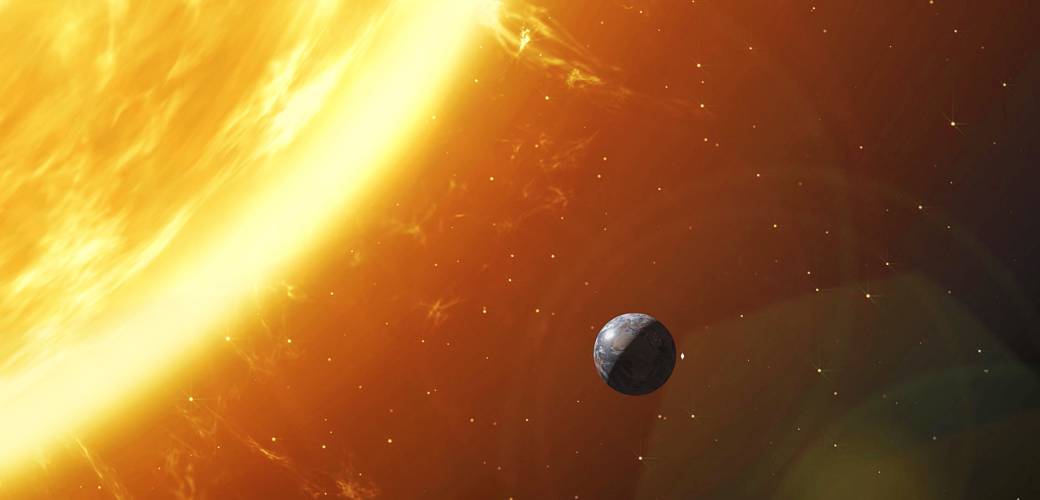what would happen to earth without the sun

Sunlight
No lord's day, no life on earth
The lord's day is the virtually inhospitable and hostile place imaginable: glowing hot, mortiferous radiation and devouring everything that enters its realm. Withal, its light is considered the source of life on globe. How does that work together?
The sunday is a huge nuclear reactor in the center of our solar system. Over a billion-years, hydrogen converted to helium at the core of the sun where the temperature is an unbelievable 15 million°C. A massive amount of energy is continuously released. It flows as radiation from the surface into space, warms our planet and sets in motion many chemical and physical processes.
Without sunlight, it would exist bleak on earth. At that place wouldn't be any plants, animals and people. There would exist no other class of life. No fossil free energy sources such every bit coal, oil and natural gas would be available to generate energy.
The sun keeps the engine running for the water cycle: evaporation → cloud formation → precipitation. And information technology shapes the conditions on earth by heating the earth'due south surface to varying degrees. Wind and hydropower plants? Solar power systems? Without lord's day, these wouldn't piece of work.
Low-cal: brighter than a 1000000 light bulbs
Without sunlight, it would exist completely nighttime on earth. Nosotros owe our daylight to the fact that every square meter on the sun shines brighter than a 1000000 lite bulbs. Once sunlight hits the globe, it scatters in the atmosphere. Nosotros would also have to cede romantic nights when the moon is full. We wouldn't see our earth'south companion since it doesn't polish its ain lite, but just reflects lite from the sun. Without the sun there would be no vegetation on world, because every plant needs light to live and grow. The dominicus even enables them to generate oxygen past means of photosynthesis, which humans and animals need to breathe.
Warmth: not too much and not as well little
The earth'due south position in the solar arrangement is optimal for the development of life. It is exactly the right distance from the sun. Information technology is simply far plenty abroad to keep us from called-for. And nosotros become the corporeality of warmth needed for humans, animals and plants to live. If the sun would get out, no life could survive on near of earth's surface within a few weeks. H2o and air would freeze over into sheets of water ice.
The lord's day sustains all life on earth, it shines on usa, warms the globe, the seas, the atmosphere, it influences the climate, information technology causes dry out periods and ice ages, information technology causes wind, which blows over the earth and determines our atmospheric condition. It's storms disrupts radio communication, causes electric discharges, and even tree rings are marked with radioactive decay.
-
Herbert Friedman
Die Sonne, 1997

Even in Antarctica, the coldest place on our planet, temperatures seldom drop below minus fifty°C. Without the lord's day's radiation, the temperature would be anywhere about the accented zero of minus 273°C. Life would have never connected nor even have come into existence.
Rain: a never-catastrophe cycle
Information technology's always raining somewhere in the world. By the way, the place with the highest rainfall in the world is in Hawaii: at Mountain Wai'ale'ale on the island of Kauai, it rains an boilerplate of 335 days a year with 12,000 millimeters of raindrops per square meter!
Rivers are constantly conveying rain water back to the ocean. Why doesn't the ocean sometimes overflow? You lot guessed information technology, the dominicus is responsible. All the world's water flows in a cycle. The warm rays of the sun evaporate the h2o from the world'south surface, including the ocean'south water. That's why the sea level stays the same all the time. The vapor rises until there is colder air. Then tiny aerosol settle on dust particles and form clouds.
If the cloud becomes too heavy or hits a mountain, the water falls as rain on the ground. Seas, rivers and lakes are replenished. The h2o that falls to the ground seeps into the groundwater and and then flows into the rivers — or evaporates from buildings, roads and all sealed surfaces condign a office of the water wheel again.
Wind: air in motility
In fact, wind can only be with the sunday. The dominicus doesn't heat the world evenly. Some air in the atmosphere heats upwardly faster than other depending on the latitude. Also, at that place are significant temperature differences betwixt the unlike layers of air.
Warm air masses act similar a magnet and attract cold air. The movement of air masses give rise to winds and depending on the forcefulness, we feel a light cakewalk, high winds, or a dangerous storm. Over the ocean, winds constantly blow at varying strengths, sometimes lighter sometimes stronger. This is also caused by the sun. When the sun shines, the air heats up faster over land than over the sea. The warmer air expands and rises. Cold air flows into the empty space that has been created at the surface. This movement of air mass is what we experience as current of air.
On a side note: At night, information technology cools down faster on state compared to the ocean. That's why the current of air direction turns at night and blows towards the ocean.
With the support of BASF, Jacob Beautemps from Breaking Lab took a closer look at where the immense ability of the sun actually comes from. Take a expect, it'southward huge. (Video in High german language)
Source: https://www.carecreations.basf.com/core-competencies/all-about-sun/sunlight/no-sun-no-life-on-earth
0 Response to "what would happen to earth without the sun"
Post a Comment